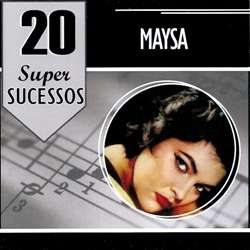Maysa - 20 Super Sucessos (1977)
Maysa - 20 Super Sucessos (1977)

01. Ouça 02. Meu Mundo Caiu 03. Chão De Estrelas 04. Se Todos Fossem Iguais A Você 05. Eu Sei Que Vou Te Amar 06. Meditação 07. Manhã De Carnaval 08. As Praias Desertas 09. Chorou, Chorou 10. Besame Mucho play 11. Quizás, Quizás, Quizás 12. Un Jour Tu Verrás 13. Cheiro De Saudade 14. A Felicidade 15. A Noite De Nós Dois 16. Alguém Me Disse 17. Chora Tua Tristeza play 18. Chanson D' Amour 19. Eu Não Existo Sem Você 20. Estou Para Dizer Adeus
Maysa was, together with Dolores Duran, the most popular singer/songwriter in the period immediately before bossa nova. A composer since her teens (at 12 she wrote the samba-canção "Adeus," a hit from her first album), Maysa kept throughout her career her appreciation for the sentimental style known as fossa. Nevertheless, Maysa pioneered in the international style of bossa nova in shows at the Olympia (Paris, France), Blue Angel (U.S.), and the Cassino Estoril (Portugal), having had success with three bossa classics, "Meditação" (Tom Jobim/Newton Mendonça), "Dindi" (Tom Jobim/Aloysio de Oliveira), and "Se Todos Fossem Iguais a Você" (Tom Jobim/Vinicius de Moraes). Maysa's everlasting fame as a composer is credited mainly to her bolero-influenced sambas-canções "Ouça" and "Meu Mundo Caiu." She also had success with her "Felicidade Infeliz." As an interpreter, her hits were "Bom dia, Tristeza" (Adoniran Barbosa/Vinicius de Moraes), "Ne Me Quite Pas" (Jacques Brel), "Solidão" (Antônio Bruno), "Bloco da Solidão" (Jair Amorim/Evaldo Gouveia), and "Tristeza" (Haroldo Lobo/Niltinho). Having married the heir of the family of millionaire descendents of the Count Matarazzo at 18, two years later she was already pregnant with her only son, Jayme Monjardim, who would later become a TV director. Maysa Matarazzo impressed producer Roberto Corte-Real with her singing and he invited her to record. Maysa waited for her son to turn a year old and then recorded her first album.
The company, RGE, was still then a jingle recording facility and became a phonographic label due to Corte-Real's insistence in launching Maysa. She preferred her album not to be the first one produced by the new company, and it was released as number 13. The 10" LP Convite Para Ouvir Maysa (late 1956) had eight tracks, among them the hits "Adeus," "Resposta," "Rindo de Mim," and "Marcada." The immediate success as a singer and songwriter brought a major situation to her marriage. Her husband, disapproving of her artistic career, decided to divorce her, which led her into a depression and sublimating her highly melancholic production in the fossa style. The fame brought by the first album opened to Maysa the doors of TV (in 1957, she got her own show at TV Record); she also had success in her shows at the Oásis and Cave nightclubs. The other three volumes of Convite Para Ouvir Maysa, released between 1958 and 1959, had the classics "Ouça" and "Meu Mundo Caiu." Having moved to Rio de Janeiro in 1960 by Ronaldo Bôscoli's invitation (with whom she kept an affair), Maysa approached the bossa nova group and started to record the bossa repertory. In Rio, Maysa appeared regularly on a TV show and released the LP O Barquinho, an important album that had the accompaniment of Luís Eça, Hélcio Milito, and Bebeto Castilho, who in 1962 would constitute the Tamba Trio (having Bebeto replace Otávio Bailly). After her European tour, Maysa settled in Spain where she met her second husband. Visiting Brazil from time to time, she participated in the Festival Internacional da Canção/FIC (International Song Festival), with "Dia da Vitória" (Luís Bonfá/M. H. Toledo). In 1969, Maysa returned to Brazil and opened the live-recorded show Canecão Apresenta Maysa, followed by a season in São Paulo. In the early '70s, she also started to work in the cinema and TV, having participated in soap operas and written music for them. In 1976, "Meu Mundo Caiu" was included on the soundtrack of the soap opera Estúpido Cupido, enjoying another wave of popularity, now among the younger generations. In January of the next year, she died instantly in a tragic car crash at the Rio-Niterói bridge. --- Alvaro Neder, allmusic.com
download (mp3 @320 kbs):
yandex 4shared mega mediafire zalivalka cloudmailru uplea
Zmieniony (Piątek, 04 Grudzień 2015 22:35)








